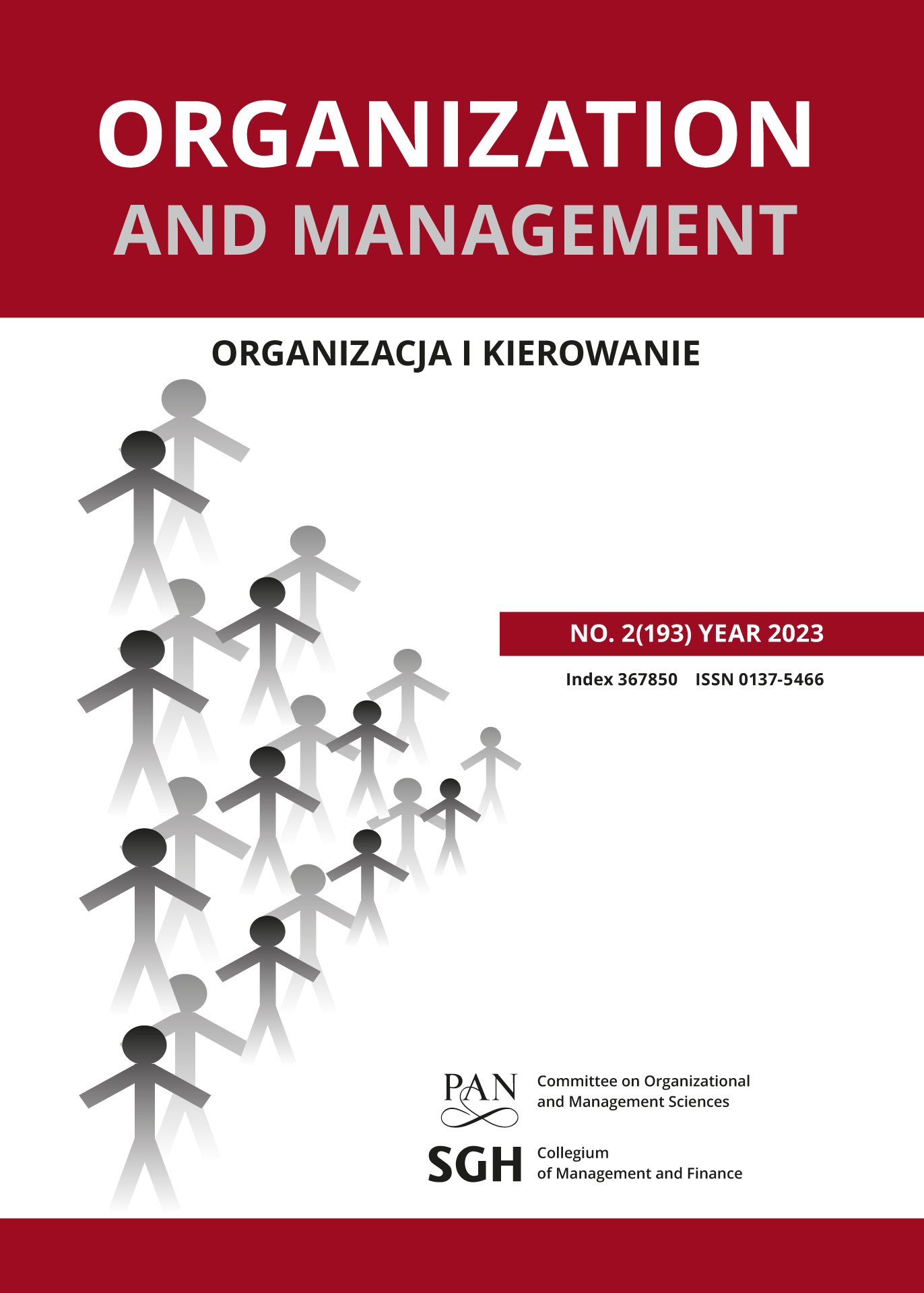THE IMPACT OF THE ZERO WASTE CONCEPT ON CONSUMER BEHAVIOR IN THE SELECTED INDUSTRY
Main Article Content
Abstract
The article contributes to research on sustainable development with a special focus on the impact of climate change pressure and shrinking resources on the activities of enterprises in the clothing industry. It presents the results of research on the impact of the zero waste
concept on consumer behavior supporting the circular economy. Data for analysis were collected in surveys and analyzed using structural equation modeling (SEM). The results were interpreted in the context of CSR and stakeholder theory. The obtained results indicate
the important role of attitudes and perceived control in shaping zero waste behavior in terms of clothing consumption. They present subjective norms and awareness of consequences as irrelevant predictors.
Article Details
References
[2]. Arvola, A., Vassallo, M., Dean, M., Lampila, P., Saba, A., Lähteenmäki, L., Shepherd, R., 2008. Predicting intentions to purchase organic food: The role of affective and moral attitudes in the Theory of Planned Behaviour. Appetite 50, 443–454. https://doi.org/10.1016/j.appet.2007.09.010
[3]. Bagozzi, R.P., Yi, Y., 1988. On the evaluation of structural equation models. J. Acad. Mark. Sci. 16, 74–94. https://doi.org/10.1007/BF02723327
[4]. Bianchi, C., Birtwistle, G., 2012. Consumer clothing disposal behaviour: a comparative study: Consumer clothing disposal behaviour. Int. J. Consum. Stud. 36, 335–341. https://doi.org/10.1111/j.1470-6431.2011.01011.x
[5]. Botetzagias, I., Dima, A.-F., Malesios, C., 2015. Extending the Theory of Planned Behavior in the context of recycling: The role of moral norms and of demographic predictors. Resour. Conserv. Recycl. 95, 58–67. https://doi.org/10.1016/j.resconrec.2014.12.004
[6]. Chen, M.-F., Tung, P.-J., 2010. The Moderating Effect of Perceived Lack of Facilities on Consumers’ Recycling Intentions. Environ. Behav. 42, 824–844. https://doi.org/10.1177/0013916509352833
[7]. Chin, W.W., 1998. The partial least squares approach to structural equation modeling. Mod. Methods Bus. Res. 295, 295–336.
[8]. Chu, P.-Y., Chiu, J.-F., 2003. Factors Influencing Household Waste Recycling Behavior: Test of an integrated Model. J. Appl. Soc. Psychol. 33, 604–626. https://doi.org/10.1111/j.1559-1816.2003.tb01915.x
[9]. Cohen, J., 1988. Statistical power analysis for the behavioral sciences, 2nd ed. ed. L. Erlbaum Associates, Hillsdale, N.J.
[10]. Duhoux, T., Le Blévennec, K., Manshoven, S., Grossi, F., Arnold, M., Mortensen, L.F., 2022. Textiles and the Environment. The role of design in Europe’s circular economy. European Topic Centre Circular Economy and Resource Use.
[11]. Esposito Vinzi, V., Chin, W.W., Henseler, J., Wang, H. (Eds.), 2010. Handbook of Partial Least Squares: Concepts, Methods and Applications. Springer Berlin Heidelberg, Berlin, Heidelberg. https://doi.org/10.1007/978-3-540-32827-8
[12]. Fawad, 2022. Understanding R Square, F Square, and Q Square using SMART-PLS [WWW Document]. URL https://researchwithfawad.com/index.php/lp-courses/basic-and-advance-data-analysis-using-smart-pls/understanding-r-square-f-square-and-q-square-using-smart-pls/ (accessed 6.26.22).
[13]. Hair, J.F. (Ed.), 2014. A primer on partial least squares structural equations modeling (PLS-SEM). SAGE, Los Angeles.
[14]. Hair, J.F., Sarstedt, M., Ringle, C.M., Mena, J.A., 2012. An assessment of the use of partial least squares structural equation modeling in marketing research. J. Acad. Mark. Sci. 40, 414–433. https://doi.org/10.1007/s11747-011-0261-6
[15]. Henseler, J., Ringle, C.M., Sarstedt, M., 2015. A new criterion for assessing discriminant validity in variance-based structural equation modeling. J. Acad. Mark. Sci. 43, 115–135. https://doi.org/10.1007/s11747-014-0403-8
[16]. Henseler, J., Ringle, C.M., Sinkovics, R.R., 2009. The use of partial least squares path modeling in international marketing, in: Sinkovics, R.R., Ghauri, P.N. (Eds.), Advances in International Marketing. Emerald Group Publishing Limited, pp. 277–319. https://doi.org/10.1108/S1474-7979(2009)0000020014
[17]. Kelly, T.C., Mason, I.G., Leiss, M.W., 2006. University community responses to on-campus resources recycling. Resour. Conserv. Recycl. 47, 42–55. https://doi.org/10.1016/j.resconrec.2005.10.002
[18]. Khan, F., Ahmed, W., Najmi, A., Younus, M., 2019. Managing plastic waste disposal by assessing consumers’ recycling behavior: the case of a densely populated developing country. Environ. Sci. Pollut. Res. 26, 33054–33066. https://doi.org/10.1007/s11356-019-06411-4
[19]. Kudłak, R., 2022. Przegląd badań dotyczących społecznych i środowiskowych efektów zaangażowania przedsiębiorstw w CSR. Przegląd Organ. 11–18. https://doi.org/10.33141/po.2022.06.02
[20]. Oom Do Valle, P., Rebelo, E., Reis, E., Menezes, J., 2005. Combining behavioural theories to predict recycling involvement. Environ. Behav. 37, 364–396. https://doi.org/10.1177/0013916504272563
[21]. Polskie Stowarzyszenie Zero Waste, 2023. URL https://zero-waste.pl/o-nas/#nasza-misja (accessed 9.28.23).
[22]. Ringle, C.M., Sarstedt, M., Mitchell, R., Gudergan, S.P., 2020. Partial least squares structural equation modeling in HRM research. Int. J. Hum. Resour. Manag. 31, 1617–1643. https://doi.org/10.1080/09585192.2017.1416655
[23]. Schwartz, S.H., 1977. Normative Influences on Altruism, in: Advances in Experimental Social Psychology. Elsevier, pp. 221–279. https://doi.org/10.1016/S0065-2601(08)60358-5
[24]. Sidique, S.F., Lupi, F., Joshi, S.V., 2010. The effects of behaviour and attitude on drop-off recycling activities. Resour. Conserv. Recycl. 54, 163–170. https://doi.org/10.1016/j.resconrec.2009.07.012
[25]. Spałek, S., Kozubek, R., 2019. Społecznie odpowiedzialne innowacje - desygnat pojęcia i definicja operacyjna. Organ. Kier. 1, 23–31.
[26]. Tonglet, M., Phillips, P.S., Read, A.D., 2004. Using the theory of planned behaviour to investigate the determinants of recycling behaviour: a case study from Brixworth, UK. Resour. Conserv. Recycl. 41, 191–214. https://doi.org/10.1016/j.resconrec.2003.11.001
[27]. Wan, C., Shen, G.Q., Yu, A., 2014. The role of perceived effectiveness of policy measures in predicting recycling behaviour in Hong Kong. Resour. Conserv. Recycl. 83, 141–151. https://doi.org/10.1016/j.resconrec.2013.12.009
[28]. Zdonek, I., Mularczyk, A., Polok, G., 2021. The Idea of Corporate Social Responsibility in the Opinion of Future Managers—Comparative Research between Poland and Georgia. Sustainability 13, 7045. https://doi.org/10.3390/su13137045
